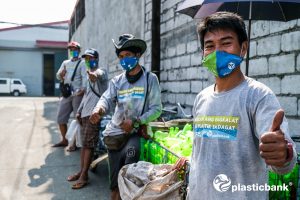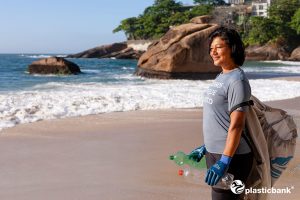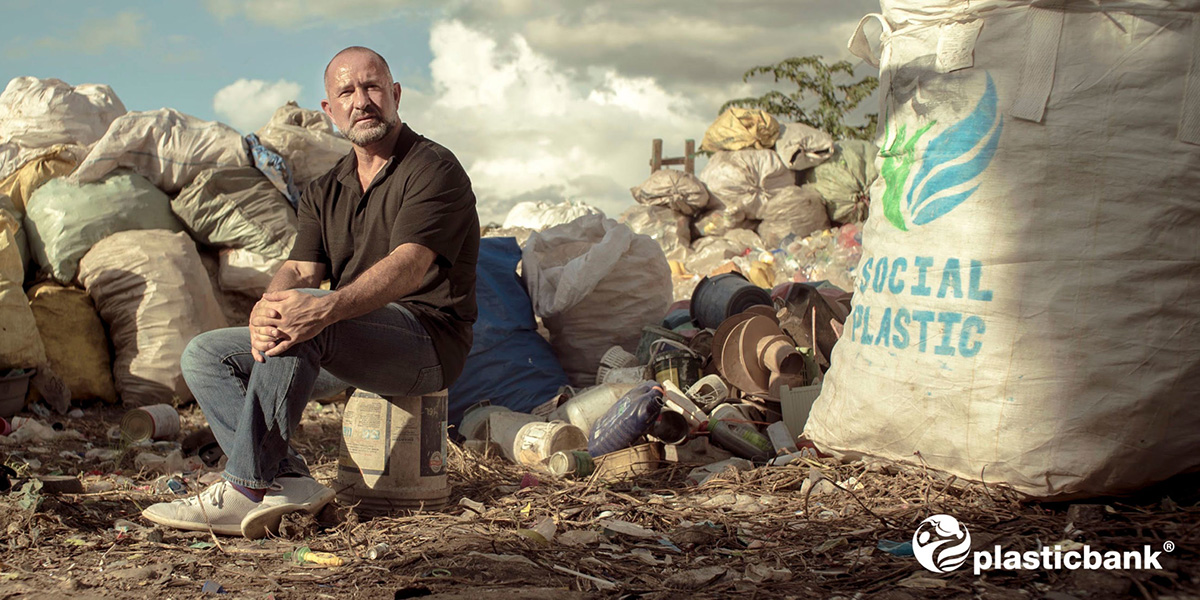In Canada, discarded single-use plastic containers—shampoo bottles, water bottles, plastic bags—can be found everywhere, heaped in recycling bins, strewn on sidewalks, and left on park benches. For most of us in the developed world, plastic has minimal value beyond the immediate, short-lived convenience it provides.
But for many in some of the poorest parts of the world, plastic is paving the path towards long-term prosperity. For the single father living in building rubble in Haiti, plastic is making his dream of affording a university education for his daughters a reality. Plastic has also helped the young Indonesian family, who lost its patriarch and main income earner, survive thanks to access to life insurance. And for the pregnant couple in the Philippines, plastic allowed them to pay for vital childbirth services rather than take on crippling debt from an extortionate moneylender.
Countless stories of possibility like these would not exist without the innovation and vision of BCIT alumnus David Katz. With an entrepreneurial mindset and a desire to help lift the world’s poorest communities, he founded Plastic Bank in 2013 with Co-Founder Shaun Frankson. A Vancouver-based social enterprise that builds recycling ecosystems in under-developed communities, Plastic Bank endeavours to fight plastic pollution in oceans and high poverty levels in developing countries.
“Imagine if every piece of plastic packaging that everyone in the world has ever encountered was worth $5?” asks David, Chairman and CEO of Plastic Bank. “How many pieces of plastic garbage would we still see in the environment? How many would we see flowing into the ocean? We know there would be none because everyone would be rushing to pick them up.”
Plastic pollution offers path to ending poverty
Today, most of the world’s plastic pollution (e.g., plastic bottles and bags) is clogged in the ocean, adding up to about 75 trillion pieces of plastic and microplastics (UNESCO, May 2022). Only 10 per cent of the plastic in the world is recycled.
The impact of this glut of plastic pollution includes human health and climate change (Geneva Environment Network, June 2023). For example, microplastics are in the food chain and traces have been found in human cells and organs. And the production and disposal-by-incineration of plastics contribute significantly to greenhouse gas emissions and global warming
Plastic pollution was not much better 10 years ago, when David saw the mounting plastic pollution crisis as a path to help the world’s poorest. That’s when he created Plastic Bank.
“I started seeing the degradation of humanity at the ocean’s edge 40 years ago,” says David, who grew up on Vancouver Island. “Because of that, I have become passionate about speaking for those who have no voice. For me, the work itself is much less about the marine environment and much more about conditions of poverty and creating a space to help people solve their own poverty.”
Through Plastic Bank, David has created a way to do just that.
How Plastic Bank works
“Instead of trying to clean up the plastic in the ocean, which is almost impossible, I wanted to focus on stopping plastic from entering the ocean—what we call ‘ocean-bound plastic’,” says David. “For that to happen, I needed to transact plastic so that it had more value.”
Honing in on the world’s poorest areas—where David says about 80 per cent of plastic comes from—Plastic Bank identifies the vulnerable coastlines that need this infrastructure. It empowers local entrepreneurs to establish collection branches and engage community members in collecting plastic before it enters the ocean. Local entrepreneurs exchange collected plastic at a branch for income or credits that can be used to provide life-improving benefits and help lift community members out of poverty.

“The value or benefit to the community members who collect plastic is delivered in things like school tuition, micro-loans for businesses, health insurance, and Wi-Fi,” David explains. “We’ve created money out of plastic—social plastic—in the world’s poorest communities.”
The collected plastic is then processed and recycled into feedstock. This feedstock is purchased by partnering manufacturers like SC Johnson and Henkel, giving life to old plastic and reducing demand for manufacturing new plastic.
The impact of social recycling

This ‘social recycling’ has made a big impact. Since inception, Plastic Bank has stopped more than 90 million kg of plastic from going into the ocean (1 kg of plastic is equivalent to 50 plastic bottles). Over 38,500 individual collectors in more than 600 recycling communities across Southeast Asia, Latin America, and Africa earn a secure income by collecting plastic and exchanging it at a Plastic Bank branch.
Globally recognized as a thought leader, advocate, and innovator, the organization has received numerous accolades including the RCBC Environmental Awards for Innovation (2014), the EO Global Citizen Award (2014), the Nature Inspiration Award (2018), the SDG Action Award – Connector Award (2019), Game Changer of the Year (2019), and Prix Voltaire International (2019).
Entrepreneurial BCIT education is the foundation
David, who graduated from the BCIT Hospitality – Administration program, credits his education for setting the foundation for his entrepreneurial career.
“The thing about BCIT is that it is an entrepreneurial education,” he explains. “The heavy course load, the many deadlines, and working in groups were foundational to what would become my career. At BCIT, I was constantly surrounded by like-minded entrepreneurial types who provoked creativity in me. I also learned how to share creativity and enlist others in that creativity.”
To entrepreneurial BCIT students and alumni who want to carve out a career with social purpose, David encourages everyone to be aware of their actions as a reflection of their beliefs: “Remember, ‘how you do anything is how you do everything’.”
Read more stories about BCIT alumni making a difference in climate change:
- Protecting the planet: BCIT Ecological Restoration alum looks to Indigenous land stewardship with hope for the future
- Seagate President and BCIT alum Scott Comfort says mass timber key to the future of sustainable construction
- BCIT alum Justin Perry mitigates BC wildfires using drone technology
- The future is green: Alumnus and CEO of Properate says green buildings can help us live healthier and solve the climate crisis
